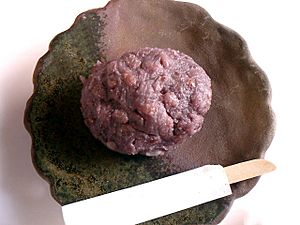Botamochi facts for kids
 |
|
| Type | Confectionery, Rice cake |
|---|---|
| Place of origin | Japan |
| Main ingredients | glutinous rice, rice, sweet red bean paste |
| Variations | Ohagi |
Botamochi (ぼたもち or 牡丹餅) is a delicious Japanese sweet. It is a type of rice cake made from special kinds of rice. The main ingredients are glutinous rice, regular rice, and sweet azuki (red bean) paste.
To make botamochi, the rice is first soaked for about an hour. Then, it is cooked. After cooking, a thick azuki paste is carefully shaped by hand around small balls of the cooked rice. Botamochi is often eaten as a special, sacred offering during the spring and autumn Higan weeks in Japan.
Contents
What is Ohagi?
Another name for this sweet is ohagi (おはぎ). Some people say that ohagi uses a slightly different texture of azuki paste. It is usually made in autumn. Both botamochi and ohagi can also be covered with a coating of soy flour after the azuki paste is added.
Why two names?
The two different names, botamochi and ohagi, are said to come from flowers. Botamochi is linked to the Botan (peony) flower, which blooms in the spring. Ohagi is linked to the Hagi (Japanese bush clover) flower, which blooms in the autumn. This helps people remember which season each name is traditionally used for.
History of Botamochi
Botamochi is the modern name for an old Japanese dish called kaimochi (かいもち). This dish was mentioned in a very old Japanese story collection from the Heian Period called Uji Shūi Monogatari (宇治拾遺物語). The Heian Period was a time in Japanese history from 794 to 1185.
A Lucky Proverb
In Japan, there is a famous proverb that uses the word botamochi. It is Tana kara botamochi (棚からぼたもち). This literally means "a botamochi falls down from a shelf." It is used to describe a very lucky event, like getting something good unexpectedly, or having a "lucky break."
Botamochi in Art
The term botamochi is also used to describe a special pattern found on Bizen ware. Bizen ware is a type of Japanese pottery. This pattern has two, three, or five round marks on the pottery. These marks look like the small balls of rice cakes were left on the plate.
See also
In Spanish: Botamochi para niños
 | Sharif Bey |
 | Hale Woodruff |
 | Richmond Barthé |
 | Purvis Young |

